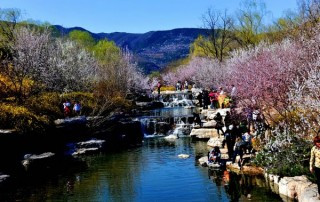Qingming Festival (清明节 - Qīngmíng jié), also called Pure Brightness Festival or Tomb Sweeping Day, is a national festival that goes back more than 2500 years! It is a day centered around sadness and happiness at the same time. On the one hand, it is the most important day of honoring the deceased. On this day, people sweep their ancestor’s graves and only eat cold food. Qingming Festival on the other hand, also indicates the return of spring. It marks the period to start plowing and sowing, since temperatures will start to raise and rainfalls will increase.

Origin
Where does Qingming Festival come from? Well, Emperor Xuanzong of the Tang dynasty (618-907) wanted to curb the practice of the extravagant and flamboyantly expensive ceremonies many ancient emperors held in order to pay respects to the ancestors. He ordered that only one day a year, on the day of the Qingming solar term, people could properly honor the death. The act of Tomb Sweeping actually belongs to the Hánshí Festival (寒食节 - Cold Food Festival), the day before Qingming, which was initiated by Duke Wen of the Jin State in order to commemorate Jie Zitui. As time passed, those two festivals were later combined into one.
Customs
During Qingming Festival, one of the most important customs is paying respect to the deceased by sweeping their tombs and offering them their favorite food and wine.
You may see people burning stacks of paper money (fake, obviously!) as it is believed that in this way the money will be accessible for your ancestor to use in their new life. Now, the original tradition of burning money as changed in burning lots of different paper model, that represents things that will be useful for people in their afterlife. You can read an unbelievable list in here, from ChinesePod.
Apart from honoring the death, it is also the day to celebrate the hope of spring and take a spring outing (踏青 – Tàqīng, “treading on the greenery”). After the cold winter, nature revives again. Trees turn green, flowers blossom, wildlife awakes and the sun shines brightly.
The food for Qingming jie is called Qingtuan, that are sweet green rice balls. The custom of making these sweet balls dates back to over 2,000 years ago.
By the way, have you seen our brand new program? Cooking program in Shanghai this summer!
Show your love for Chinese food!
Flying kites is also a very popular custom during Qingming. A lot of people go to parks to fly their kites, not only during the day, but especially at night. They add little lanterns on the kite or on the strings that hold the kite so it seems like twinkling stars in the sky. Once the kite is in the air, some people cut the string to set it free. They believe it brings good luck and eliminates diseases.
Legend
Qingming Festival wouldn’t be a real Chinese festival without a legend attached to it! In a nutshell, the legend of Tomb Sweeping Day goes as follows:
A prince named Chong’er escaped the severe fights in the Jin States during the Spring and Autumn Period and the Warring States (770 – 476 BC), after which he began his exile with his followers. One day, Chong’er was almost starving to death, when Jie Zitui, his very loyal servant, cut a piece of meat from his own leg and cooked it into a meat soup in order to feed his lord and saved his life. Very moved by this act of loyalty, the prince promised to reward Jie someday.
Nineteen years later, prince Chong’er returned to his kingdom and became Duke Wen of the Jin State. After obtaining power, Duke Wen greatly rewarded all his followers, but forgot Jie Zitui. Ashamed of this, he ordered his servants to go and look for Jie Zitui so he could confer him with a title. Jie Zitui however, kindly refused the invitation and told the servants that he was not the kind of person who sought profit or fame and he fled with his mother into the mountains. Duke Wen wanted to thank Jie Zitui personally and gave orders to burn down the forest in order to force Jie out. Unfortunately, a few days later, Duke Wen found two dead bodies, that of Jie Zitui and his mother. Filled with remorse, Duke Wen buried them respectfully and ordered everyone to not use fire and only eat cold food on that day.
The following year, Duke Wen, climbed the mountain to commemorate Jie Zitui. He was surprised and very moved to see how the burnt willow tree under which Jie Zitui and his mother were buried revived. He swept the tomb and declared that day to be the Qingming Festival.
So, pay your respect to your ancestors today, sweep away all the dust from their stones, honor them by offering them their favorite food and drinks and afterwards …
inhale the fresh vibes of spring!